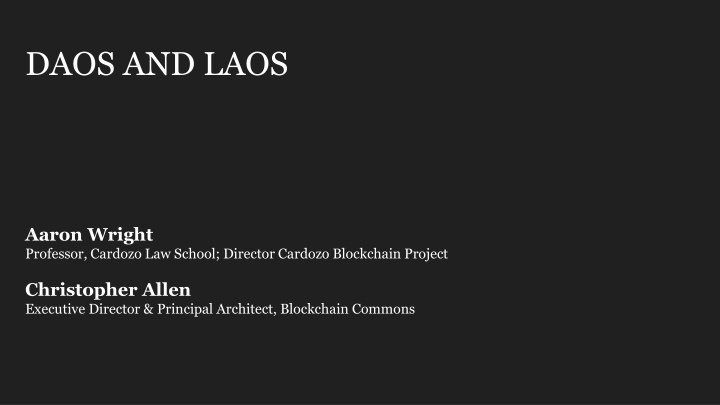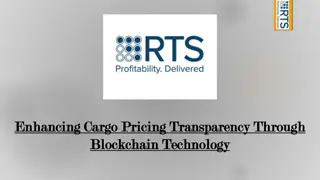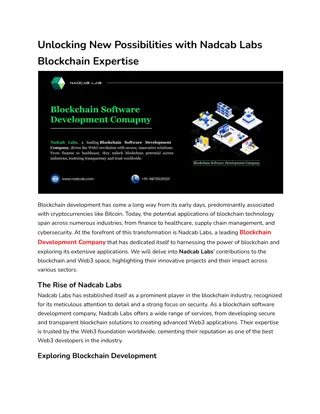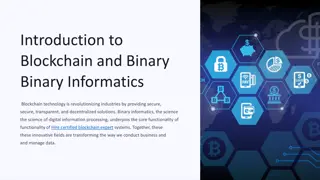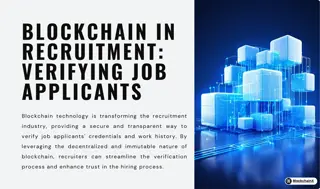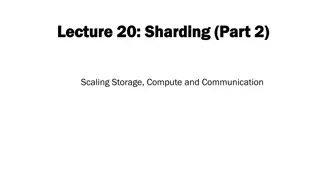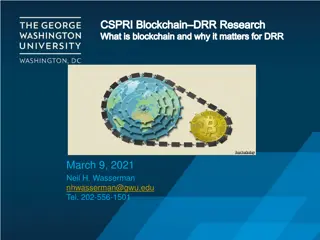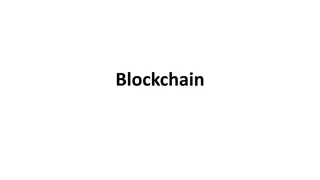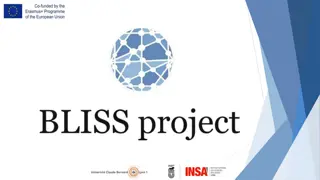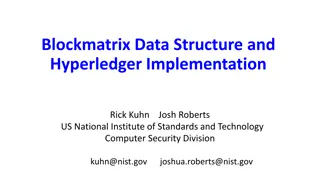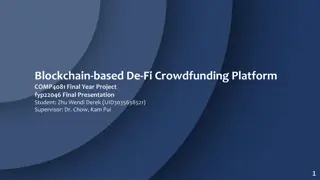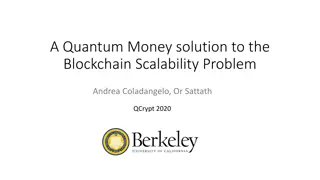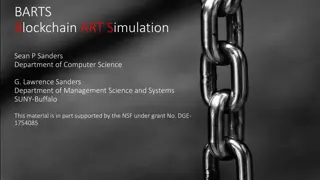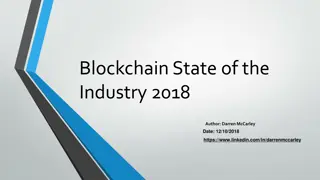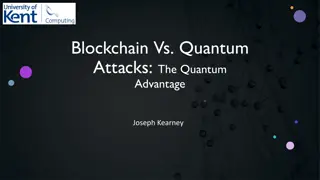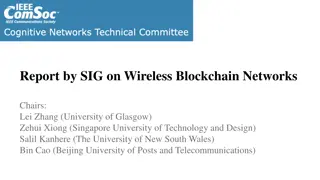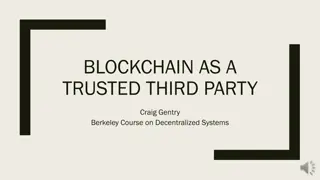The Evolution of Organizations and Blockchain Innovation
The future of organizations is being shaped by innovations in blockchain technology, with DAOs emerging as a major organizational structure. Wyoming has been at the forefront of this revolution, paving the way with blockchain-specific legislation and enabling the growth of Internet-native organizations. Explore how decentralized autonomous organizations are redefining coordination of human activities and transforming our economic and social interactions.
Download Presentation

Please find below an Image/Link to download the presentation.
The content on the website is provided AS IS for your information and personal use only. It may not be sold, licensed, or shared on other websites without obtaining consent from the author.If you encounter any issues during the download, it is possible that the publisher has removed the file from their server.
You are allowed to download the files provided on this website for personal or commercial use, subject to the condition that they are used lawfully. All files are the property of their respective owners.
The content on the website is provided AS IS for your information and personal use only. It may not be sold, licensed, or shared on other websites without obtaining consent from the author.
E N D
Presentation Transcript
DAOS AND LAOS Aaron Wright Professor, Cardozo Law School; Director Cardozo Blockchain Project Christopher Allen Executive Director & Principal Architect, Blockchain Commons
THE FUTURE OF ORGANIZATIONS Each new era of innovation has created new way to coordinate human activity - - - - The age of exploration birthed chartered corporations The industrial era in the US heralded the joint stock company The railroad boom created preferred shares The oil shocks and growth of global finance fueled the creation of limited liability companies
DAOS COULD BE THE NEXT MAJOR ORGANIZATIONAL STRUCTURE Blockchains hold out the promise of changing the financial world, if not the entire Internet by fostering decentralized, open networks and protocols. One of the emerging structures to support these efforts are DAOs. DAOs help people organize their affairs using software (potentially accompanied by associated legal agreements) to build organizations that are highly automated and Internet-native.
INTERNET NATIVE ORGANIZATIONS The term DAO refers to a decentralized autonomous organization. DAOs come in several different variations: Member managed organizations, where group decisions are managed via blockchain-based voting. Software managed organizations, where groups are coordinated via an algorithm.
WYOMING LEAD THE LAST ORGANIZATIONAL REVOLUTION In 1977, Wyoming was the first state to allow LLCs; today, over two- thirds of all new companies formed are LLCs. In so doing, Wyoming granted individuals and business greater ability to: Express their personal autonomy, by engaging in economic and social interactions primarily based on notions of freedom to contract. Maintain financial and commercial privacy, leaving it to individuals and businesses to self-order their affairs.
WYOMING HAS LEAD THE WAY IN THE US WITH BLOCKCHAIN-SPECIFIC LEGISLATION Wyoming is already become the Delaware of digital asset law, passing sensible regulations to inter alia: Recognizes direct property rights for individual owners of digital assets of all types (virtual currencies, digital securities and utility tokens), with super-negotiability rules of commercial law applied to virtual currencies. Creating a fintech sandbox. Authorizing the first true qualified custodian for digital assets.
WYOMING IS LEADING THE WAY FOR DIGITAL CORPORATIONS Wyoming has passed three key laws as a foundation for the future of digital corporations: 2018 HB-0101 Authorized digital corporate records, shareholders represented by keys. 2019 HB-0105 Authorized corporate stock recorded and settled on a blockchain. 2019 HB-070 Authorized and funded the Wyoming Secretary of State to develop and implement a blockchain-based filing system to support a Corporate Birth Certificate and Corporate Proof of Good Standing.
DAOS ARE DIFFERENT FROM C-CORPORATIONS The Wyoming digital corporation statutes are forward thinking. However, most DAOs operate with different assumptions than for stock-based C corporations: Flat hierarchically and participatory in nature Not contemplated to be run by managers but directly by members Highly transparent, in terms of fund management and voting decisions (if applicable) Preference for strong minority rights to withdraw capital if the organization no longer suits the members needs or expectations.
DAOS ARE WELL SUITED FOR LLC-LIKE STRUCTURES DAOs in many ways are more akin to member-managed LLCs. But, many DAO want their members to manage their affairs primarily using software, as opposed to traditional contracts. The software sets the expectation of members and people order their affairs privately. The potential reach and vision for these entities is more expansive than LLCs--multi-jurisdictional and potentially global.
WYOMING CAN LEAD THE WAY WITH DAOs DAOs already are being structured to be backed by LLCs, with hopes of complying with US state and federal law. These entities often are being referred to as LAOs --limited liability autonomous organizations. LAOs aim to limit DAO-members liability to creditors and give members the power to structure their affairs privately. In effect, LAOs are hybrid entities: partly backed by existing legal regimes and operating primarily via software. They are also identifiable by state regulators and other officials.
WYOMING LLC LAWS LARGELY ACCOMMODATE LAOS; BUT IMPROVEMENTS COULD SPUR GROWTH DAOs that rely on an underlying LLC (LLAOs) face certain struggles: 1. They have to put together extensive operating agreements that modify many of the existing statutory default rules related to LLCs. 1. It is sometimes unclear what the status of financial interest in a LAOs is (i.e. a security or commodity).
EXPLORE SIMPLIFYING DEFAULT RULES FOR DAOS It is expensive for parties to put together an LLC operating agreement and DAOs often want to vary these default rules in a ways that are permissible under Wyoming and other states LLC laws, as interpreted by courts. For example, via contract, DAO members agree to: Limit the need to have an express manager or owner of the LLC. Modify books and records requirements so that they are managed by blockchains and blockchain-based software. Limit fiduciary obligations, if desired. Preserve privacy of DAO-members through non-disclosure obligations or otherwise.
EXPLORE EXPRESSLY PERMITTING LLCS TO DEFER TO SOFTWARE Similar to Wyoming s recent digital corporation statutes, DAOs currently use an operating agreement to state that DAOs intend that their internal affairs be managed entirely, or partially, by software. Expressly permitting members to do so could eliminate legal ambiguity.
THE ABOVE CHANGES WOULD REDUCE COST FOR FUTURE DAOS The aforementioned amendments would align with existing common law or other Wyoming initiatives and would limit the time and expense of creating a DAO employing an underlying LLC structure. It also could conceivably significantly reduce the cost of, or even eliminate the need for a custom operating agreement, depending on the scope of the legislation.
CLARIFY WHEN LLC INTERESTS FOR DAOS WILL AND WILL NOT BE CONSIDERED SECURITIES DAOs can be structured to protect individuals and often employ a high degree of transparency. Software can ensure and/or provide that: Individual members cannot disproportionately influence organizational decisions. Members have the right to withdraw their capital at any point in time, limiting the ability of the organization to mismanage a member s assets. Members hold DAO assets for a specified period of time.
CLARIFY WHEN LLC INTERESTS FOR DAOS WILL AND WILL NOT BE CONSIDERED SECURITIES Whether LLC interests are securities is an often fraught analysis, but tends to turn on whether there is a party in control of the organization and whether there are information asymmetries. For many DAOs, this is not the case by design. A statute that codifies existing common law to articulate under what circumstances a DAO- interest will be considered a security could help foster responsible organizations and help organizations manage legal risk.
SIMPLIFY PROCEDURAL REQUIREMENTS FOR DAOS All Wyoming corporations must select a registered agent to accept legal service on behalf of the legal entity. There are currently two forms, an individual registered agent and a commercial registered agent registered with the Secretary of State Wyoming could authorize a new form of registered agent, a digital registered agent, that could do more: Maintain the names and addresses of applicable members ( PII ), to limit DAO-centralization Protect the PII of owners, maybe related to data repository trust Pay taxes, offer escrow services, and other financial trust fiduciary services without being considered money transfer agents
